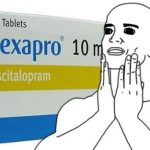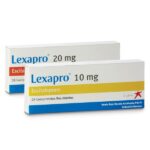I Accidentally Took 40mg Of Lexapro

According to the CDC, Nearly 841,000 people have died since 1999 from a drug overdose. In 2019, 70,630 drug overdose deaths occurred in the United States. The age-adjusted rate of overdose deaths increased by over 4% from 2018 (20.7 per 100,000) to 2019 (21.6 per 100,000).
The most common error people make with their medicines is taking – or giving – a double dose. Or, someone gets distracted and takes a prescription medicine once – and then again. For some medicines, an extra dose can cause problems.
What is Lexapro?
Lexapro is a brand of escitalopram, an antidepressant medication that works in the brain. It is approved for the treatment of major depressive disorder (MDD) and generalized anxiety disorder (GAD).
Lexapro may also be helpful when prescribed “off-label” for obsessive compulsive disorder (OCD), eating disorders such as binge eating disorder or bulimia nervosa, panic disorder, posttraumatic stress disorder (PTSD), and premenstrual dysphoric disorder (PMDD). “Off-label” means that it hasn’t been approved by the Food and Drug Administration for this condition. Your mental health provider should justify his or her thinking in recommending an “off-label” treatment. They should be clear about the limits of the research around that medication and if there are any other options.
How Long Does It Take For Lexapro To Work?
Sleep, energy, or appetite may show some improvement within the first 1-2 weeks. Improvement in these physical symptoms can be an important early signal that the medication is working. Depressed mood and lack of interest in activities may need up to 6-8 weeks to fully improve.
What Should I Discuss With My Health Care Provider Before Taking Lexapro?
• Symptoms of your condition that bother you the most
• If you have thoughts of suicide or harming yourself
• Medications you have taken in the past for your condition, whether they were effective or caused any adverse effects
• If you experience side effects from your medications, discuss them with your provider. Some side effects may pass with time, but others may require changes in the medication.
• Any other psychiatric or medical problems you have, including a history of bipolar disorder
• All other medications you are currently taking (including over the counter products, herbal and nutritional supplements) and any medication allergies you have
• Other non-medication treatments you are receiving, such as talk therapy or substance abuse treatment. Your provider can explain how these different treatments work with the medication.
• If you are pregnant, plan to become pregnant, or are breastfeeding
• If you drink alcohol or use drugs.
Is it OK to take 40 mg of Lexapro?
No, Lexapro 40mg is a high dose. The dose of this medication usually ranges from 10 mg to 20 mg. Depending on individual patient response, the dose may be increased to a maximum of 20 mg daily. Usually, 2-4 weeks are necessary to obtain an antidepressant response. After the symptoms resolve, treatment for at least 6 months is required for consolidation of the response. Only your health care provider can determine the correct dose for you.
Lexapro is usually taken one time per day with or without food. Typically patients begin at a low dose of medicine and the dose is increased slowly over several weeks.
Consider using a calendar, pillbox, alarm clock, or cell phone alert to help you remember to take your medication. You may also ask a family member or friend to remind you or check in with you to be sure you are taking your medication.
What to do If You accidentally took double dose of Lexapro?
Symptoms of Lexapro overdose can include:
• dizziness.
• low blood pressure.
• sleep problems.
• nausea, vomiting.
• fast heart rate.
• seizures, and coma.
If you accidentally took a double dose of Lexapro, call the poison control helpline at 1-800-222-1222. Information is also available online at https://www.poisonhelp.org/help. If the victim has collapsed, had a seizure, has trouble breathing, or can’t be awakened, immediately call emergency services at 911.
What Happens If I Miss A Dose Of Lexapro?
If you miss a dose of Lexapro, take it as soon as you remember, unless it is closer to the time of your next dose. Discuss this with your health care provider. Do not double your next dose or take more than what is prescribed.
What Should I Avoid While Taking Lexapro?
Avoid drinking alcohol or using illegal drugs while you are taking antidepressant medications. They may decrease the benefits (e.g., worsen your condition) and increase adverse effects (e.g., sedation) of the medication.
What Are The Possible Side Effects Of Lexapro?
Common side effects
Headache, nausea, diarrhea, dry mouth, increased sweating, feeling nervous, restless, fatigue, or having trouble sleeping (insomnia). These will often improve over the first week or two as you continue to take the medication.
Sexual side effects, such as problems with orgasm or ejaculatory delay often do not diminish over time.
Rare/serious side effects
Low sodium blood levels (symptoms of low sodium levels may include headache, weakness, difficulty concentrating and remembering), teeth grinding, angle closure glaucoma (symptoms of angle closure glaucoma may include eye pain, changes in vision, swelling or redness in or around eye), serotonin syndrome (symptoms may include shivering, diarrhea, confusion, severe muscle tightness, fever, seizures, and death), seizure.
SSRI antidepressants including Lexapro may increase the risk of bleeding events. Combined use of aspirin, nonsteroidal anti-inflammatory drugs (e.g., ibuprofen, naproxen), warfarin, and other anti-coagulants may increase this risk. This may include symptoms such as gums that bleed more easily, nose bleed, or gastrointestinal bleeding. Some cases have been life threatening.
Are There Any Risks For Taking Lexapro For Long Periods Of Time?
To date, there are no known problems associated with long term use of Lexapro. It is a safe and effective medication when used as directed.
What Other Medications May Interact With Lexapro?
Lexapro should not be taken with or within 2 weeks of taking monoamine oxidase inhibitors (MAOIs). These include phenelzine (Nardil®), tranylcypromine (Parnate®), isocarboxazid (Marplan®), rasagiline (Azilect®), and selegiline (Emsam®).
Although rare, there is an increased risk of serotonin syndrome when Lexapro is used with other medications that increase serotonin, such as other antidepressants, migraine medications called “triptans” (e.g., Imitrex®), some pain medications (e.g., tramadol (Ultram®), the antibiotic linezolid (Zyvox®), and amphetamines.
Lexapro may increase the effects of other medications that can cause bleeding (e.g., ibuprofen (Advil®, Motrin®), warfarin (Coumadin®) and aspirin).
Summary Of FDA Black Box Warnings
Suicidal thoughts or actions in children and adults
Depression and certain other psychiatric disorders are themselves associated with increases in the risk of suicide. Patients with major depressive disorder (MDD), both adult and pediatric, may experience worsening of their depression and/or the emergence of suicidal ideation and behavior (suicidality) or unusual changes in behavior, whether or not they are taking antidepressant medications. This risk may persist until significant remission occurs.





